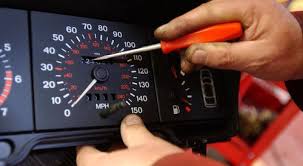
Breaking News
Starlink Spy Network: Is Elon Musk Setting Up A Secret Backchannel At GSA?
 The Worst New "Assistance Technology"
The Worst New "Assistance Technology"
 Vows to kill the Kennedy clan, crazed writings and eerie predictions...
Vows to kill the Kennedy clan, crazed writings and eerie predictions...
Top Tech News
 Scientists reach pivotal breakthrough in quest for limitless energy:
Scientists reach pivotal breakthrough in quest for limitless energy:
 Kawasaki CORLEO Walks Like a Robot, Rides Like a Bike!
Kawasaki CORLEO Walks Like a Robot, Rides Like a Bike!
 World's Smallest Pacemaker is Made for Newborns, Activated by Light, and Requires No Surgery
World's Smallest Pacemaker is Made for Newborns, Activated by Light, and Requires No Surgery
 Barrel-rotor flying car prototype begins flight testing
Barrel-rotor flying car prototype begins flight testing
 Coin-sized nuclear 3V battery with 50-year lifespan enters mass production
Coin-sized nuclear 3V battery with 50-year lifespan enters mass production
 BREAKTHROUGH Testing Soon for Starship's Point-to-Point Flights: The Future of Transportation
BREAKTHROUGH Testing Soon for Starship's Point-to-Point Flights: The Future of Transportation
 Molten salt test loop to advance next-gen nuclear reactors
Molten salt test loop to advance next-gen nuclear reactors
 Quantum Teleportation Achieved Over Internet For The First Time
Quantum Teleportation Achieved Over Internet For The First Time
 Watch the Jetson Personal Air Vehicle take flight, then order your own
Watch the Jetson Personal Air Vehicle take flight, then order your own
 Microneedles extract harmful cells, deliver drugs into chronic wounds
Microneedles extract harmful cells, deliver drugs into chronic wounds
Odometers Rolled Forward

A class-action lawsuit – Hinton v. Tesla – has been filed in the U.S. District Court for the Central District of California. The chief plaintiff, Nyree Hinton, claims that rather than registering actual miles driven, Tesla vehicles register odometer readings based on "predictive algorithms" tied to energy consumption. Hinton claims the odometer in his 2020 Model Y read "at least 15 percent fast," according to an MSNB news story about the lawsuit. He claims that his daily drive of about 20 miles often accrued 70 miles of driving on the odometer, resulting in his Model Y accruing more than 50,000 miles sooner than it otherwise would have and being out-of-warranty sooner than it would have, leaving him to foot a $10,000 bill for repairs that would have been covered under warranty.
If the allegations are true, it's pretty bad – for Tesla. The possibility of not just a wholesale recall/buyback scenario looms but also catastrophic reputational damage that may not be fixable. Tesla is already on the outs with its core buyer demographic for political reasons; it may soon be on the outs for more traditional reasons. No one likes being gypped. The word is apt because this probably isn't a case of something inadvertent but rather, deliberate. As in purposeful fraud.
And in more than just one way.
If Teslas overstate how far they've been driven, they are also overstating their range. If this is true, then they do not go as far as advertised, which would arguably constitute fraud (again) if it is true. Of course, all EVs are arguably fraudulent in this regard because all of them tout ranges that are at best optimistic because they are predicated on optimum conditions, especially as regards the temperature and the corollary use of accessories such as the AC and heat especially. When it is very cold outside, battery-powered devices are less efficient; they lose charge faster – a problem compounded when accessories such as the heater are used. Both for the passenger compartment and the battery, which must be kept above freezing in order for you to be able to recharge it.
When it is very hot outside, the charge winnows faster because you're probably using the AC to keep cool – and because the EV's thermal management system is trying to keep the battery cool.
I can "expert witness" attest – because I have test driven pretty much every EV on the market – that it is common for the actual driving range to be 10-20 percent less than what is touted when it's cold or hot. This would be grounds for a federal inquisition – and a mass recall/buyback situation – if we were talking about a gas-engined vehicle that touted say 40 MPG actually delivered 32 MPG (20 percent off) or even a lot less than that. EVs have been allowed to get away with what is on the face of it false advertising – a nicer way of saying gypping people – because they are political vehicles. Tesla can be seen – because it's true – as the vehicle for sexing up battery powered vehicles. They are so quick! So tech!

 Odometers Rolled Forward
Odometers Rolled Forward

